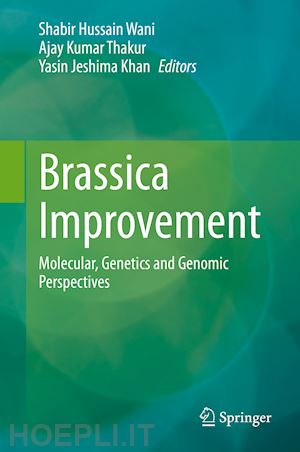

Questo prodotto usufruisce delle SPEDIZIONI GRATIS
selezionando l'opzione Corriere Veloce in fase di ordine.
Pagabile anche con Carta della cultura giovani e del merito, Carta della Cultura e Carta del Docente
Global population is mounting at an alarming stride to surpass 9.3 billion by 2050, whereas simultaneously the agricultural productivity is gravely affected by climate changes resulting in increased biotic and abiotic stresses. The genus Brassica belongs to the mustard family whose members are known as cruciferous vegetables, cabbages or mustard plants. Rapeseed-mustard is world’s third most important source of edible oil after soybean and oil palm. It has worldwide acceptance owing to its rare combination of health promoting factors. It has very low levels of saturated fatty acids which make it the healthiest edible oil that is commonly available. Apart from this, it is rich in antioxidants by virtue of tocopherols and phytosterols presence in the oil. The high omega 3 content reduces the risk of atherosclerosis/heart attack. Conventional breeding methods have met with limited success in Brassica because yield and stress resilience are polygenic traits and are greatly influenced byenvironment. Therefore, it is imperative to accelerate the efforts to unravel the biochemical, physiological and molecular mechanisms underlying yield, quality and tolerance towards biotic and abiotic stresses in Brassica. To exploit its fullest potential, systematic efforts are needed to unlock the genetic information for new germplasms that tolerate initial and terminal state heat coupled with moisture stress. For instance, wild relatives may be exploited in developing introgressed and resynthesized lines with desirable attributes. Exploitation of heterosis is another important area which can be achieved by introducing transgenics to raise stable CMS lines. Doubled haploid breeding and marker assisted selection should be employed along with conventional breeding. Breeding programmes aim at enhancing resource use efficiency, especially nutrient and water as well as adoption to aberrant environmental changes should also be considered. Biotechnological interventions are essential for altering the biosynthetic pathways for developing high oleic and low linolenic lines. Accordingly, tools such as microspore and ovule culture, embryo rescue, isolation of trait specific genes especially for aphid, Sclerotinia and alternaria blight resistance, etc. along with identification of potential lines based on genetic diversity can assist ongoing breeding programmes. In this book, we highlight the recent molecular, genetic and genomic interventions made to achieve crop improvement in terms of yield increase, quality and stress tolerance in Brassica, with a special emphasis in Rapeseed-mustard.











Il sito utilizza cookie ed altri strumenti di tracciamento che raccolgono informazioni dal dispositivo dell’utente. Oltre ai cookie tecnici ed analitici aggregati, strettamente necessari per il funzionamento di questo sito web, previo consenso dell’utente possono essere installati cookie di profilazione e marketing e cookie dei social media. Cliccando su “Accetto tutti i cookie” saranno attivate tutte le categorie di cookie. Per accettare solo deterninate categorie di cookie, cliccare invece su “Impostazioni cookie”. Chiudendo il banner o continuando a navigare saranno installati solo cookie tecnici. Per maggiori dettagli, consultare la Cookie Policy.